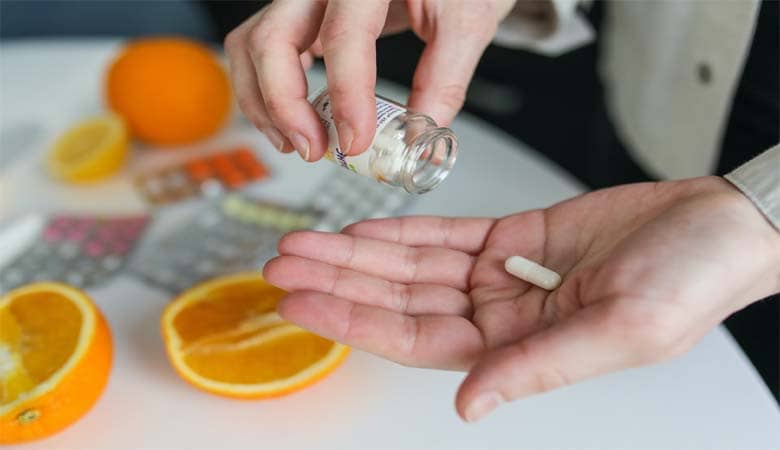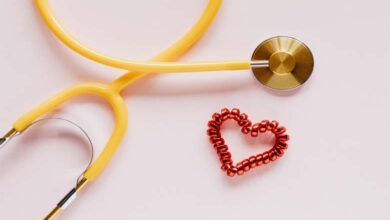7 Tips for Taking Medications as You Age

Taking medications correctly and safely becomes increasingly important as we age because our bodies undergo changes that can affect how medications are absorbed and processed. Furthermore, older adults often grapple with multiple health conditions and take several medications, making medication management more complex.
To help you navigate this crucial aspect of healthcare, here are seven valuable tips for older adults to take their medications correctly and safely, ultimately improving their health outcomes and quality of life.
Tip#1: Watch for Medication Interactions
As you age, the risk of drug interactions, where one medication affects another, increases — especially if you are taking multiple medications. This problem can alter the effectiveness or increase the side effects of your prescribed medication. Additionally, certain foods like grapefruit can interact with medications, and some chronic health conditions may make certain drugs less suitable.
To avoid potential issues, ensure all your healthcare providers are aware of every medication and supplement you take, including over-the-counter drugs. This information helps them monitor and prevent interactions. When prescribed a new medication, always double-check with your doctor or pharmacist regarding potential interactions with your existing drugs, health conditions, and specific foods or beverages.
Vigilant monitoring for interactions becomes even more critical when you are managing multiple medications. Consider taking an Ulta Labs test to gain deeper insights into how certain drugs might affect your system, enhancing your ability to prevent undesirable reactions. By understanding your body’s response, you actively contribute to the safety and effectiveness of your medication regimen.
Tip#2: Utilize a Pill Organizer
A pill organizer or medication dispenser box can be an invaluable tool, especially if you need to take multiple medications regularly. These organizers feature compartments labeled for each day of the week and times of the day (morning, noon, evening, bedtime). To streamline your routine, fill out the organizer once a week by sorting your oral medications into the designated slots. This makes it effortless to see at a glance which medications are required at each time of day.
Establish a habit of refilling the pill organizer on the same day and time each week to create a consistent routine. Place your pill organizer in a designated location where you will see it during medication times, such as on the kitchen counter. Keep a small supply of medications in their original bottles in case you need to refill the organizer. Using a pill organizer minimizes the risk of missing doses, taking medication at the wrong time, or accidentally double-dosing.
Tip#3: Don’t Alter Your Medication Without Consulting Your Doctor
The temptation to skip doses of a medication to save money (or avoid side effects) can be strong. However, it is crucial to refrain from stopping, reducing doses, splitting pills, or making any other changes to your prescription medication regimen without first consulting your physician. Such actions may render the medication less effective or even dangerous in some cases.
Even if you experience unpleasant side effects, do not discontinue a drug before discussing it with your doctor. Your physician may adjust the dosage, switch you to an alternative medication, or offer other recommendations to manage side effects. They must oversee any changes to ensure you continue to receive the necessary treatment. Skipping doses, splitting pills, or taking less than prescribed without medical supervision could have adverse effects on your health. Always consult your doctor before altering your use of any prescription medication.
Tip#4: Take Medications as Directed
Take your medications exactly as prescribed and follow the instructions carefully. Adhere to the correct dosage amount at specified times. Some medications must be taken on an empty stomach, while others require food. Ingest pills with the recommended amount of water. If you are instructed to take medication multiple times a day (e.g., every 8 hours), space out the doses accordingly. Avoid chewing or crushing pills unless explicitly approved by your doctor or pharmacist.
Consider setting reminders or alarms on your phone, watch, or other devices to aid in remembering medication times. Alternatively, mark medication times on a calendar. Taking medications accurately and as directed guarantees you receive their full benefits. Always follow the instructions whenever you take a medication, and do not hesitate to consult your pharmacist if you have any questions.
Tip#5: Report Any Reactions or Side Effects
Pay close attention to your body and monitor yourself for potential side effects from medications. Report any side effects you observe to your doctor immediately, even if they seem minor. For example, inform them if you experience dizziness, headaches, nausea, an upset stomach, blurred vision, mood changes, or any other symptoms. Your physician can determine if the symptom is related to the medication and may adjust your dosage or switch you to a different drug to minimize side effects.
Avoid discontinuing a prescription medication abruptly without consulting your healthcare provider first. Engage in a discussion with your doctor about any side effects you are experiencing so they can make appropriate adjustments and help you feel better while still addressing your medical condition. Maintaining open communication about medication reactions is essential.
Tip#6: Carefully Read All Medication Labels
Never assume details about your medications or rely solely on your memory; always double-check the label! Make sure it contains the precise name of the medication, the strength or dose, instructions for when and how to take it, the expiration date, and any warnings. If you use a pill organizer, retain the original medication bottles so you can refer to the labels whenever necessary.
Compare the label instructions with your doctor’s recommendations to ensure they align. Promptly report any discrepancies or concerns to your pharmacist, especially if the medication appears different than expected. Pay close attention to labels on over-the-counter products, as ingredients and doses can vary between brands. Always read over-the-counter labels carefully and adhere to usage directions. Diligently reading labels helps prevent errors.
Tip#7: Store Medications Properly
Correctly storing medications preserves their effectiveness and prevents misuse. Unless you use a daily pill organizer, keep medications in their original labeled containers. Store these containers in a cool, dry place, avoiding humid spots like bathrooms or kitchens. Do not expose medications to temperatures exceeding 86°F, and protect them from freezing if necessary.
Monitor expiration dates and dispose of expired drugs appropriately. Always store medications in a secure location that is out of reach of children and pets. Certain medications may require refrigeration, so check the labels and store them accordingly. Proper storage, especially when sharing a household, involves keeping each person’s medications separate. Adhering to these storage guidelines ensures the integrity of your medications.
Conclusion
Following these tips for taking medications properly can significantly aid older adults in managing their health conditions, preventing complications, and enhancing their quality of life. Key points to remember include using a pill organizer, taking medications as prescribed, being vigilant about interactions, reading labels carefully, reporting side effects, and storing medications correctly. As our bodies undergo changes with age, maintaining awareness and diligence in medication use is vital for safeguarding your health.




